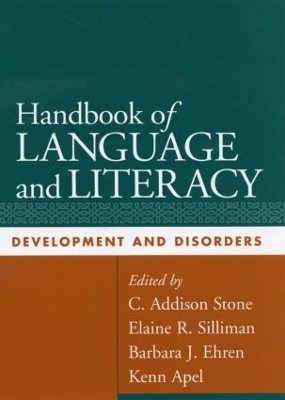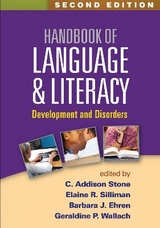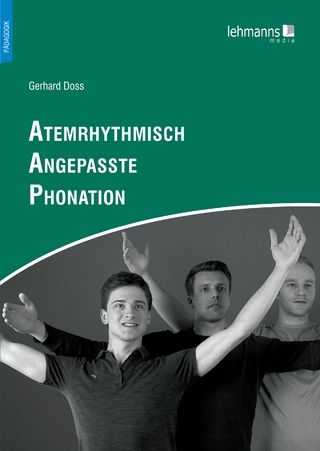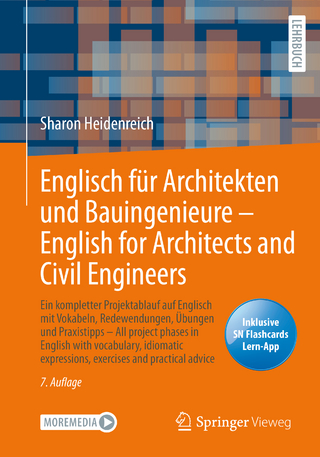
Handbook of Language and Literacy
Guilford Publications (Verlag)
978-1-59385-005-0 (ISBN)
- Titel erscheint in neuer Auflage
- Artikel merken
This handbook reviews the latest advances in theory, research, and practice in language and literacy development. The close connections between language and literacy processes - both typical and atypical - are thoroughly explored in chapters from leading authorities in communication sciences and disorders, learning disabilities, and literacy education.
The first three sections cover the cognitive and neurological underpinnings of language and literacy development and disorders; the socio-cultural contexts of learning, including ways to promote success in students at risk; and how specific language skills are related to successful and unsuccessful literacy acquisition. Building on these foundations, the final section then reviews effective applications for children, adolescents, and young adults with varying language and literacy profiles.
Research-based strategies are presented for assessing student needs and providing effective instruction in all aspects of literacy: word recognition, reading comprehension, writing, and spelling.
A groundbreaking and detailed resource in language and literacy featuring well-respected interdisciplinary contributors, this new resource bridges the gap between theory and practice.
C. Addison Stone, PhD, is Professor of Educational Studies at the University of Michigan. His research interests center on the social context of learning and development in children with language and learning disabilities. Elaine R. Silliman, PhD, CCC-SLP, is Professor of Communication Sciences and Disorders and Cognitive and Neural Sciences at the University of South Florida and a Fellow of the American Speech-Language-Hearing Association. Her research interests and publications focus on oral language-literacy connections in monolingual English speaking children with social dialect variations, bilingual (Spanish-English) children, and children with language learning disabilities. Barbara J. Ehren, EdD, CCC-SLP, is a Research Associate at the University of Kansas Center for Research on Learning and a Fellow of the American Speech-Language-Hearing Association. Her research and development work focuses in adolescent literacy, with an emphasis on the Strategic Instruction Model at the school level and on the shared responsibility of a variety of professionals for content literacy. Kenn Apel, PhD, CCC-SLP, is Professor and Chair of the Department of Communicative Disorders and Sciences at Wichita State University and a Fellow of the American Speech Language Hearing Association. His research and teaching interests are in typical and artypical language-literacy development, with a specific focus on reading and spelling.
Part I: Theoretical and Methodological Issues in the Study of Language and Literacy Disorders. Stone, Contemporary Approaches to the Study of Language and Literacy Development: A Call for the Integration of Perspectives. Gilger, Wise, Genetic Correlates of Language and Literacy Impairments. Mody, Neurobiological Correlates of Language and Reading Impairments. Meschyan, Hernandez, Cognitive Factors in Second-Language Acquisition and Literacy Learning: A Theoretical Proposal and Call for Research. Speece, Cooper, Methodological Issues in Research on Language and Early Literacy from the Perspective of Early Identification and Instruction. Part II: The Political and Social Contexts of Language and Literacy Acquisition. Silliman, Wilkinson, Brea-Spahn, Policy and Practice Imperatives for Language and Literacy Learning: Who Will Be Left Behind? Brinton, Fujiki, Social and Affective Factors in Children with Language Impairment: Implications for Literacy Learning. Wasik, Hendrickson, Family Literacy Practices. van Kleeck, Fostering Preliteracy Development via Storybook-Sharing Interactions: The Cultural Context of Mainstream Family Practices. Dickinson, McCabe, Clark-Chiarelli, Preschool-Based Prevention of Reading Disability: Realities versus Possibilities. Craig, Washington, Language Variation and Literacy Learning. Zecker, Learning to Read and Write in Two Languages: The Development of Early Biliteracy Abilities. Part III: Language Processes Underlying Atypical Literacy Learning: Complementary Perspectives. Troia, Phonological Processing and Its Influence on Literacy Learning. McGregor,
Developmental Dependencies Between Lexical Semantics and Reading. Carlisle, Morphological Processes That Influence Learning to Read. Scott, Syntactic Contributions to Literacy Learning. Donahue, Foster, Social Cognition, Conversation, and Reading Comprehension: How to Read a Comedy of Manners. Duchan, The Foundational Role of Schemas in Children's Language and Literacy Learning. Westby,
A Language Perspective on Executive Functioning, Metacognition, and Self-Regulation in Reading. Part IV: Addressing the Needs of Individuals with Language and Literacy Challenges. Word Recognition. Ehri, Snowling, Developmental Variation in Word Recognition. Roth, Word Recognition Assessment Frameworks. O'Connor, Bell,
Teaching Students with Reading Disability to Read Words. Reading Comprehension. Duke, Pressley, Hilden, Difficulties with Reading Comprehension. Carlisle, Rice,
Assessment of Reading Comprehension. Vaughn, Klingner, Teaching Reading Comprehension to Students with Learning Disabilities. Writing Composition. Singer, Bashir, Developmental Variations in Writing Composition Skills. Calfee, Wilson, A Classroom-Based Writing Assessment Framework. Wong, Berninger, Cognitive Processes of Teachers in Implementing Composition Research in Elementary, Middle, and High School Classrooms. Spelling. Cassar, Treiman, Developmental Variations in Spelling: Comparing Typical and Poor Spellers. Apel, Masterson, Niessen,
Spelling Assessment Frameworks. Bailet, Spelling Instructional and Intervention Frameworks. Special Considerations with Adolescents/Young Adults. Ehren, Lenz, Deshler, Enhancing Literacy Proficiency with Adolescents and Young Adults.
| Erscheint lt. Verlag | 24.6.2004 |
|---|---|
| Reihe/Serie | Challenges in Language and Literacy |
| Verlagsort | New York |
| Sprache | englisch |
| Maße | 174 x 246 mm |
| Gewicht | 1548 g |
| Themenwelt | Geisteswissenschaften ► Psychologie |
| Geisteswissenschaften ► Sprach- / Literaturwissenschaft ► Sprachwissenschaft | |
| ISBN-10 | 1-59385-005-0 / 1593850050 |
| ISBN-13 | 978-1-59385-005-0 / 9781593850050 |
| Zustand | Neuware |
| Haben Sie eine Frage zum Produkt? |
aus dem Bereich



